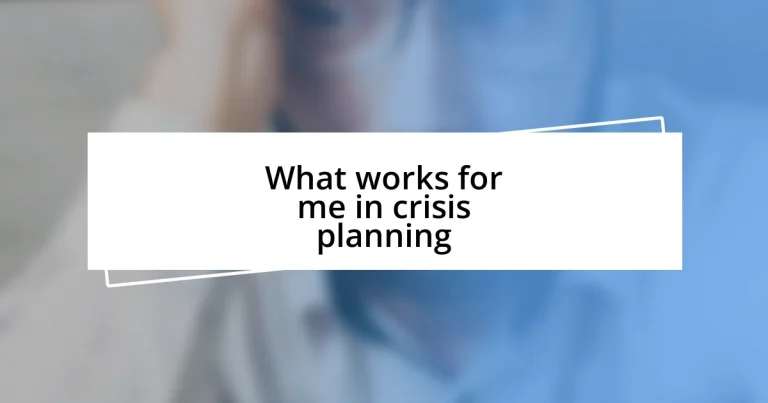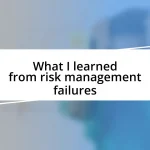Key takeaways:
- Crisis planning is essential for maintaining clarity and resilience during chaotic situations, empowering teams to make effective decisions.
- Establishing a dedicated crisis response team with diverse skills and defined roles enhances efficiency and communication during a crisis.
- Regularly testing and updating crisis plans, along with learning from past experiences, ensures preparedness and fosters continuous improvement.
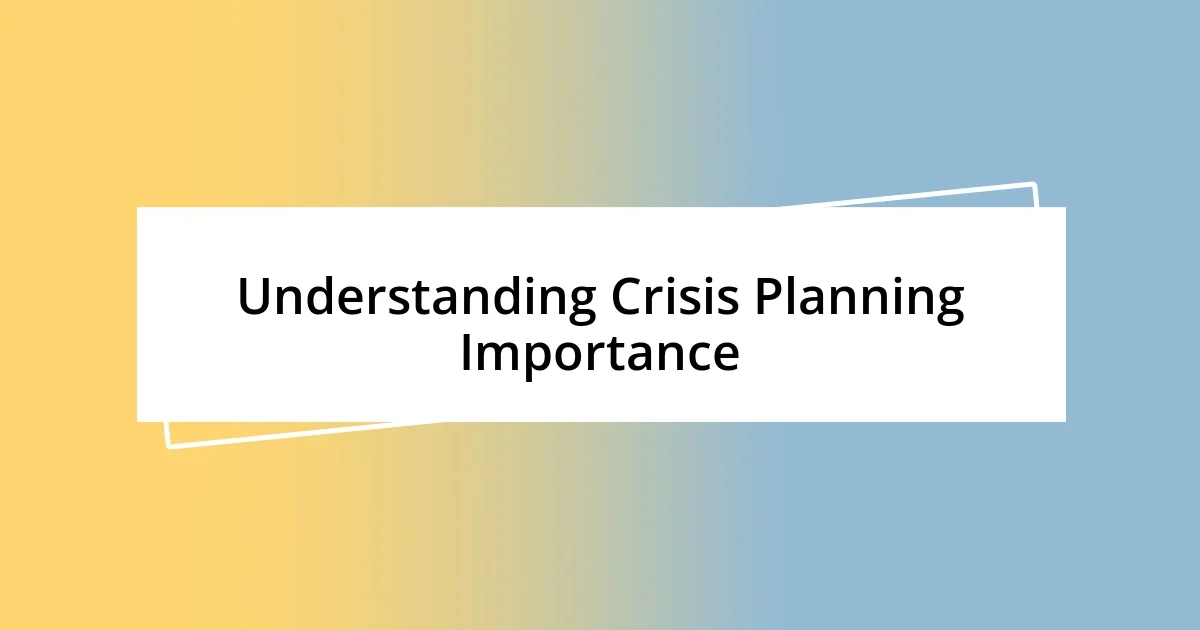
Understanding Crisis Planning Importance
Crisis planning is vital because it helps organizations navigate chaos with clarity. I remember a time when my team faced an unexpected data breach; without our crisis plan, the situation could have spiraled out of control. This experience taught me how essential it is to have a roadmap during times of uncertainty.
When a crisis hits, emotions run high, and decision-making can become clouded. I once witnessed a colleague freeze under pressure during a critical incident, while those with a clear plan remained focused and effective. Isn’t it reassuring to know that having a solid plan can empower teams to stay calm, making thoughtful decisions instead of reacting blindly?
Moreover, effective crisis planning fosters resilience. I’ve seen organizations bounce back stronger because they took the time to prepare and strategize. Wouldn’t it be wonderful if we could all cultivate that level of preparedness? Embracing the importance of crisis planning not only prepares us for the unexpected but also instills confidence in our capabilities to overcome adversity.
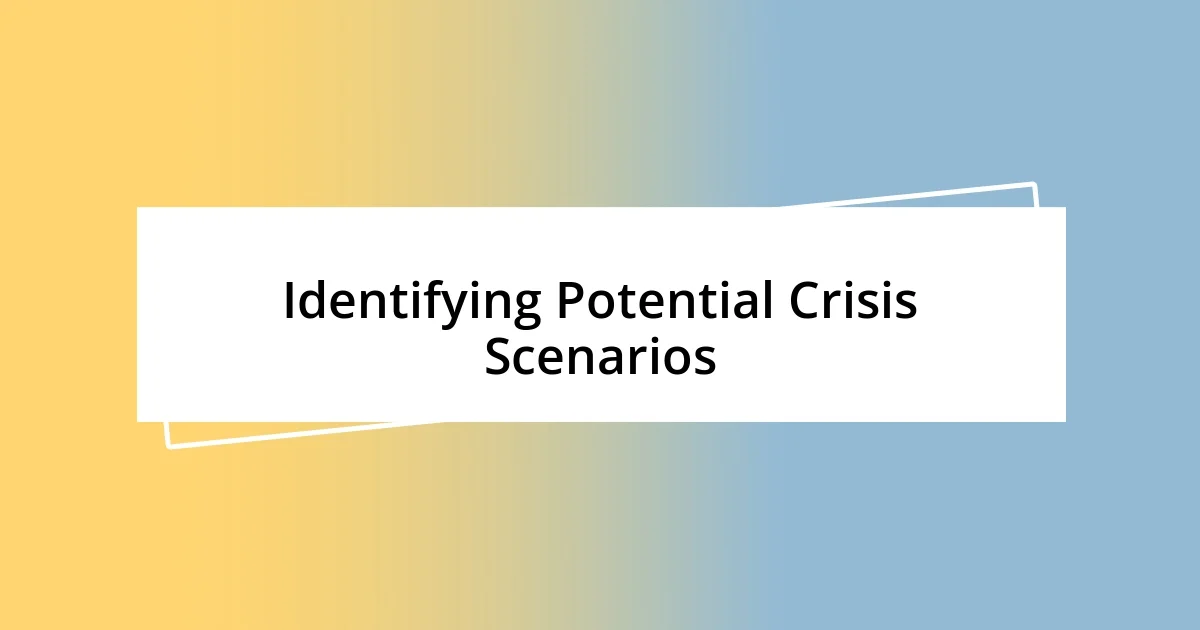
Identifying Potential Crisis Scenarios
Identifying potential crisis scenarios starts with acknowledging the unpredictable nature of our environment. I’ve often found that brainstorming with the team opens up a floodgate of ideas. Each person brings their unique perspective, illuminating possible threats I might not have considered. By discussing various scenarios together, we cultivate a comprehensive understanding of what could go wrong, which is invaluable when crafting our response strategies.
Here are some common potential crisis scenarios to think through:
- Natural disasters (like hurricanes or earthquakes)
- Cybersecurity breaches (such as data hacks or ransomware)
- Financial difficulties (including sudden drops in revenue)
- Public relations crises (like product recalls or negative press)
- Health emergencies (for example, a pandemic or workplace accidents)
Thinking about these situations isn’t just about preparing for the worst; it’s about building a mindset that prepares us for resilience amidst challenge.
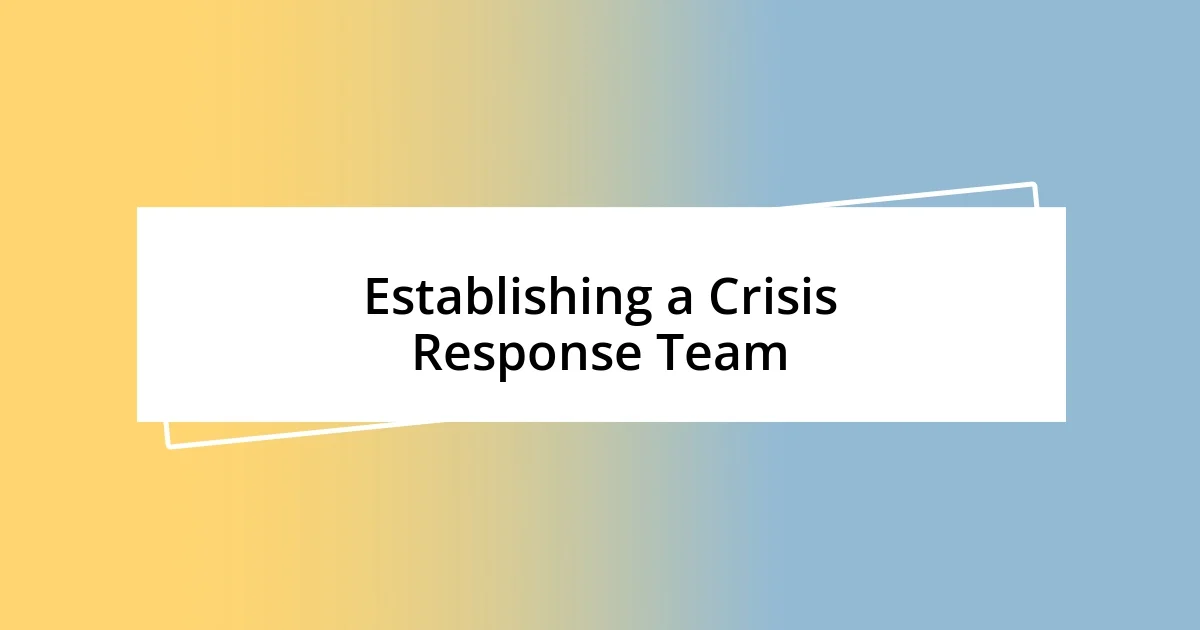
Establishing a Crisis Response Team
Establishing a crisis response team is crucial for navigating turbulent times effectively. In my experience, a well-chosen team unites diverse skills, allowing for swift decision-making during crises. I remember when our organization faced a public relations nightmare; having a dedicated team in place meant we could pull together quickly and present a united front, instead of scrambling in confusion.
When selecting team members, I emphasize the importance of involving individuals who not only possess expertise but also demonstrate emotional intelligence. During one particularly stressful situation, a calm and empathetic member of the team helped de-escalate tensions and communicated effectively with anxious stakeholders. Can you think of someone in your organization who has a knack for keeping emotions in check during a crisis? That’s the kind of person you want on your crisis response team.
Finally, creating a structured team with defined roles can greatly enhance efficiency. Each member should know their responsibilities ahead of time, which reduces chaos when a crisis strikes. In my past experiences, teams that had clear roles often outperformed those that did not, leading to quicker resolutions and less burnout. Have you ever been in a situation where role ambiguity made things worse? It’s a reminder that clarity can drive success, especially when the pressure is on.
| Criteria | Importance |
|---|---|
| Diverse Skills | Enables comprehensive strategies |
| Emotional Intelligence | Promotes calm and effective communication |
| Defined Roles | Streamlines decisions and tasks |
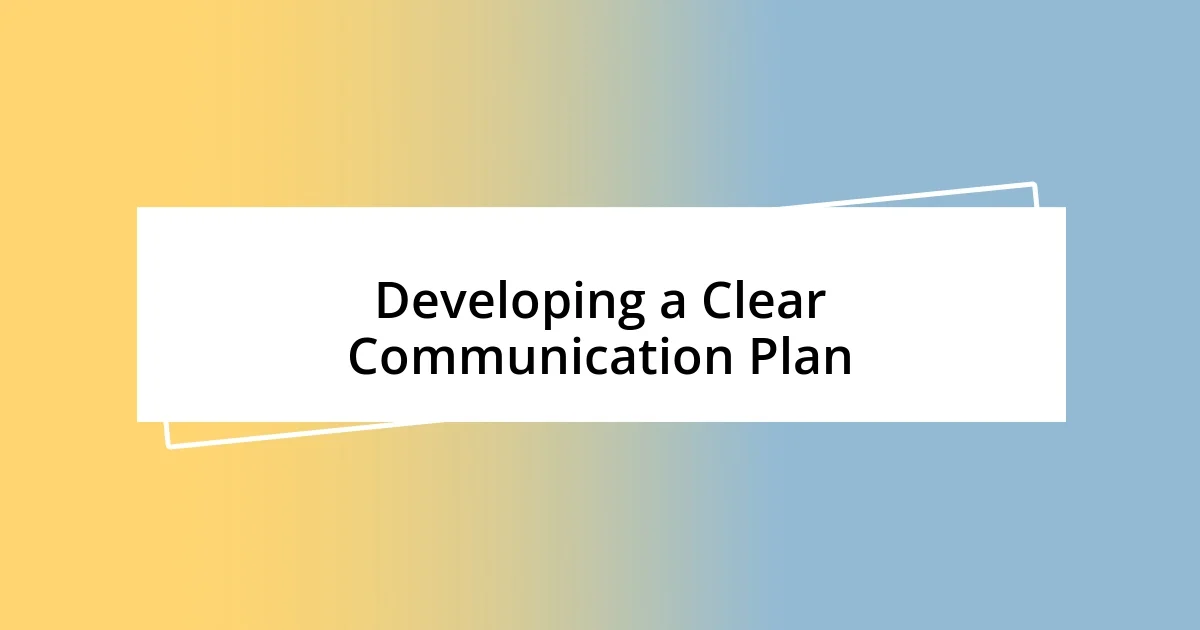
Developing a Clear Communication Plan
Developing a clear communication plan is essential in crisis planning. When I work on these plans, I always start by identifying key messages that need to be conveyed. Reflecting on my experiences, there’s nothing quite as nerve-wracking as a communications breakdown during a critical moment. In one instance, we were caught off-guard by a sudden issue; our swift decision to stick to a few core messages helped streamline our efforts and kept everyone on the same page.
Another vital aspect of a communication plan is determining who communicates what. In my previous role, we established designated spokespeople based on their expertise and comfort levels in public speaking. This significantly reduced confusion, allowing for consistent messaging across various channels. Have you ever been in a meeting where multiple voices led to mixed signals? I sure have, and it often clouded the overall message we intended to send.
Finally, I can’t stress enough the importance of reviewing and practicing the communication plan regularly. I remember a time when we simulated a crisis to test our approach. The exercise highlighted gaps we hadn’t noticed before, such as unclear protocols for issuing press releases. By refining the plan through real-life scenarios, I felt more confident and prepared when an actual crisis arose. Don’t you think that practice could make a critical difference in time of need? It certainly has for me.
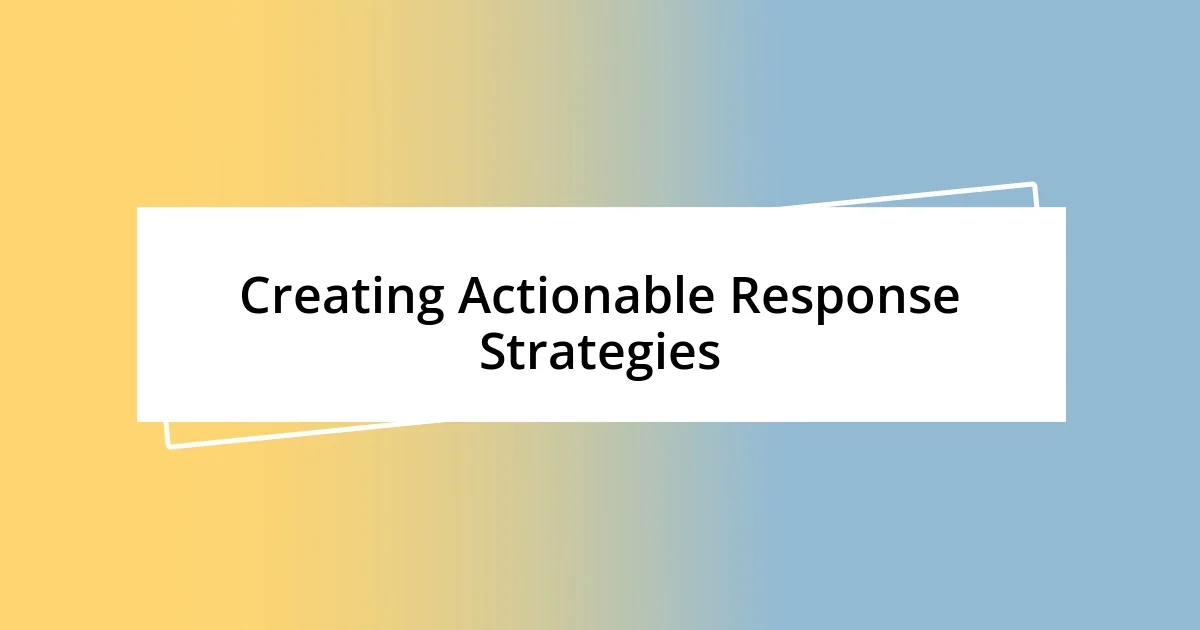
Creating Actionable Response Strategies
Creating actionable response strategies is all about being prepared and staying flexible. One strategy I find invaluable is crafting step-by-step action plans tailored to potential crises. For instance, during a data breach threat, we outlined immediate steps: isolate affected systems, inform key stakeholders, and announce a strategy for public communication. Having this playbook ready allowed us to act quickly and confidently, which, let’s be honest, is a lot better than making it up as we go along. Have you ever felt the weight of uncertainty in a crisis? It can be paralyzing if you’re not ready.
I also emphasize the role of scenario planning in developing these strategies. By simulating various crisis situations, I’ve gained insights into potential pitfalls and effective responses. In one training session, we role-played a natural disaster affecting our operations. The discussions that arose from those scenarios not only revealed weaknesses in our logistics but also fostered camaraderie among team members. Isn’t it fascinating how facing hypothetical crises together can strengthen relationships and boost morale?
Lastly, it’s crucial to keep these strategies adaptable. I’ve learned that sticking too rigidly to a plan can backfire if the situation evolves. In a recent incident, we initially targeted a specific audience with our messaging. However, as we gathered more information, changing our focus to include a broader audience proved to be the right move. How often have you struggled with sticking to a plan even when circumstances shifted? Flexibility doesn’t mean starting from scratch; it just means being open to refining our approach in real time.
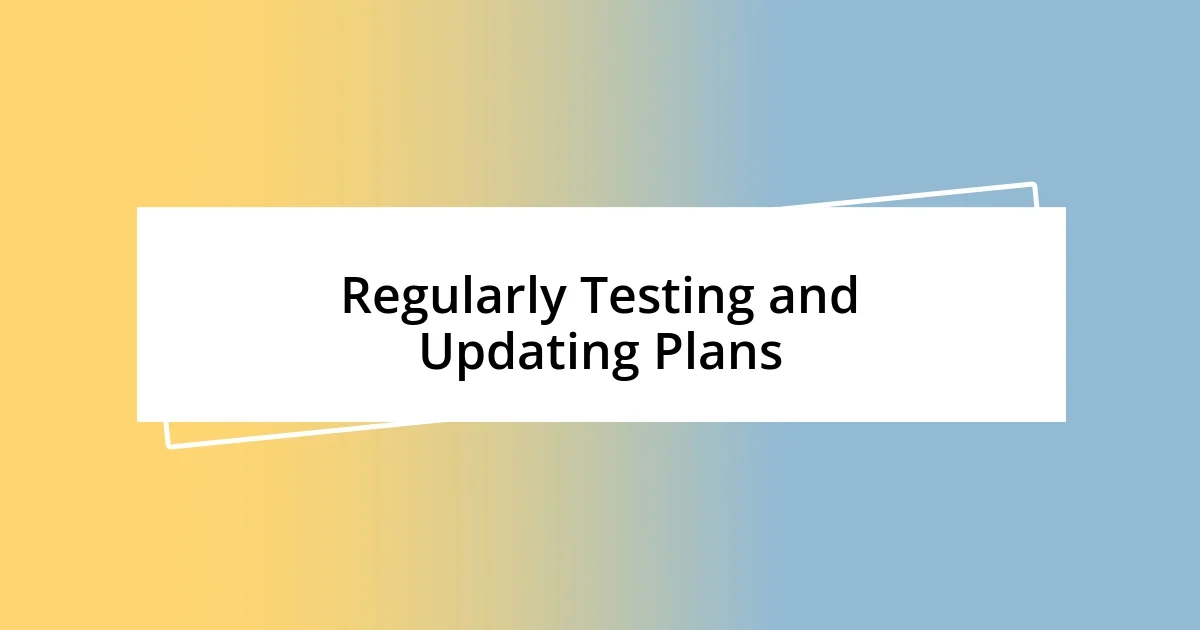
Regularly Testing and Updating Plans
Testing and updating crisis plans regularly is like keeping a well-oiled machine running smoothly. I remember a time when we updated our disaster recovery plan after a minor system outage revealed some serious gaps. It was a wake-up call; we were able to pinpoint specific areas that hadn’t been updated in years. I can’t stress enough how reassuring it felt to know that we’d beefed up our response capabilities before a real crisis hit. Have you ever thought about how often your plans may need a refresh?
Engaging in regular drills is an essential part of this process. During a recent tabletop exercise, I witnessed firsthand how different departments interacted when faced with a simulated crisis. It was eye-opening to see how vital it is for each person to understand their role thoroughly. I found myself reflecting on how an uninformed team member could derail our efforts entirely. Can you recall a moment where a lack of preparation changed the course of an event for better or worse?
Ultimately, constant evaluation helps build resilience. I’ve seen firsthand how reassessing our plans after incidents not only clarified roles but also strengthened relationships among team members, creating a sense of trust. When we can openly discuss what worked and what didn’t, it fosters an environment of continuous improvement. Isn’t it comforting to know that every test, every update, brings you one step closer to being fully prepared?
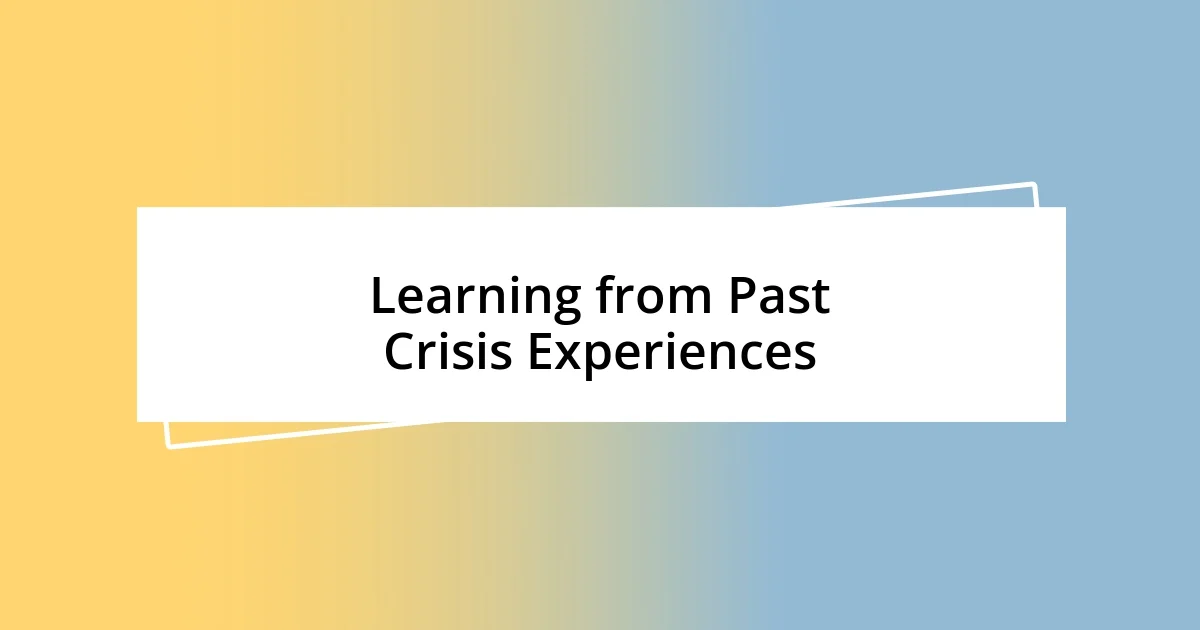
Learning from Past Crisis Experiences
Reflecting on my past experiences during crises has taught me invaluable lessons. For instance, I remember a situation where a supply chain disruption caught us off guard. We scrambled to find alternatives, realizing that we hadn’t fully assessed our dependencies. It was a moment of panic, but it also underscored the importance of having a diverse roster of suppliers. Have you ever experienced a situation that made you reevaluate your assumptions?
I often find myself thinking about a particular communication breakdown during a previous incident. We had a flood that impacted our office space, and the lack of clear, timely updates led to confusion. It was a painful but necessary lesson; we learned that being transparent with our team and stakeholders keeps everyone on the same page, even in chaotic times. Isn’t it interesting how a single moment can shift your perspective entirely?
These experiences illustrate the necessity of creating a feedback loop from past crises. After every event, I advocate for team debriefings, where we explore what worked and what didn’t. I recall one session where we unearthed misunderstandings that had lingered for months, all because we hadn’t taken the time to discuss our responses. Isn’t it fascinating how that simple act of reflection can strengthen your crisis planning for the future?












